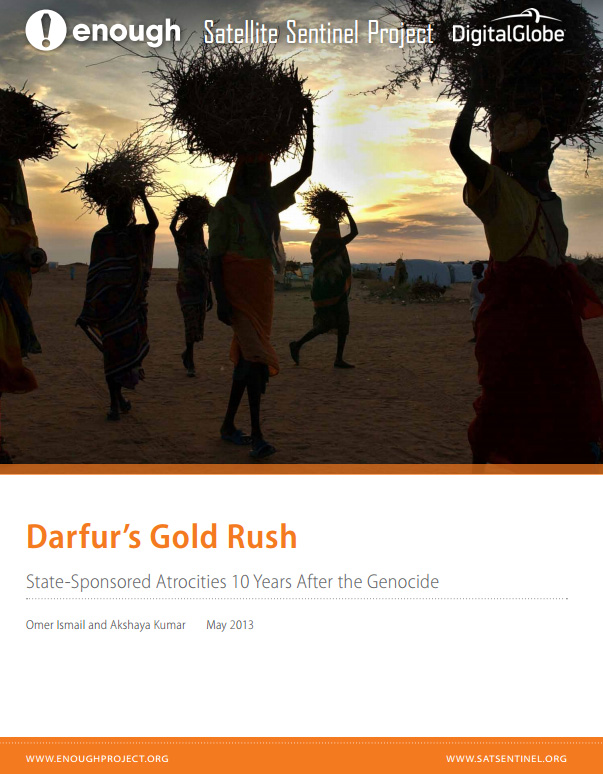
Darfur is suffering its worst humanitarian crisis in years. Since the beginning of 2013, over 200,000 people have been displaced by what the government of Sudan dismisses as “inter-communal” violence. Ten years after the first reports of genocide trickled out of Darfur, an eerie echo of the past is sweeping across the region. The government of Sudan would like the world to believe that Darfur is plagued by intractable inter-tribal hatreds that inevitably lead to violent destabilizing conflict.
But in a new report, “Darfur's Gold Rush: State-Sponsored Atrocities 10 Years After the Genocide,” Enough Project Senior Advisor Omer Ismail and I challenge that descriptive framework. Our research shows that government-armed Abbala militias’ recent power play to displace the Beni Hussein people and thereby gain control North Darfur’s gold mines is not the product of inter-tribal rivalries. Instead, the Abbala offensive must be understood as a continuation of Khartoum’s campaign of state-sponsored atrocity and plunder in the region.
For over a decade, the Sudanese central government has fragmented Darfuri society by systematically sponsoring militias and taking sides in violent confrontations. This year alone, we’ve seen government forces exacerbate clashes between Darfuri groups by backing the Abbala versus the Beni Hussein; the Beni Halba versus the Gimr; and the Taaysha versus the Salamat.
This new report focuses on the clashes between the Abbala and the Beni Hussein over Jebel ‘Amer’s gold mine, highlighting the government’s heightened economic interest in the region, and underscoring its involvement in the violence. Since the discovery of gold in North Darfur in 2010, the area has experienced a gold rush, with the population of Jebel ‘Amer jumping from 1,000 to 70,000 in just two years. This boomtown now produces a third of Sudan’s gold and hosts at least 3,000 artesinal mining sites. While we do not have documented evidence that the government of Sudan ordered the Abbala offensive, it’s clear that the historically state-aligned tribe, with ties to the janjaweed, was not acting without at least tacit government consent. During the height of the violence, Abbala leaders spoke publicly on Sudanese radio, bragging about their position within the state security forces. On many instances, militiamen used state-supplied vehicles and weapons to conduct attacks, frequently while wearing state security uniforms.
Even the Abbala communities have come to recognize the way that the government of Sudan used them for economic gain. An Abbala leader worried, “we went to war and died while other people filled their pockets with the spoils.” Ahmed Abdullah Ishaq, another Abbala chief, told Radio Dabanga that tribal hostilities in North Darfur are the result of a plan orchestrated by the ruling National Congress Party.
“I am calling upon my relatives from both sides: bloodshed and deaths are needless,” said Ishaq. “When you die, other people take advantage of your deaths… We have no enemy but the government. If the Beni Hussein annihilate the [Abbala] Rizeigat or vice-versa, they are both losers and the beneficiary is the government.”
We make six recommendations to address this dark side of Darfur's gold rush:
- The United States and other partners should support forces for democratic transformation within Sudan as they seek to secure a comprehensive peace in Darfur.
- The United States and other partners should pressure the Government of Sudan to grant humanitarian agencies unfettered access to all areas of Darfur.
- Both the international community and the government of Sudan should support the implementation of pledges made at the reconciliation conference between the Beni Hussein and Abbala tribes.
- The United States and other partners should exert pressure to ensure that those responsible for human rights abuses during this latest wave of atrocities are held accountable.
- The international donor community, including European allies and Qatar, should work to promote Darfur’s economic growth through sustainable and self-sufficient development.
- Jewelers, gold refiners, and gold exchanges should list Sudan as a “conflict affected” originating point under the Organization for Economic Cooperation and Development’s due diligence guidelines for supply chains, triggering the Gold Supplement due diligence procedures
View or download the photos and DigitalGlobe satellite imagery from the Enough Project’s Flickr site: http://www.flickr.com/photos/enoughproject/sets/72157633441382071/

